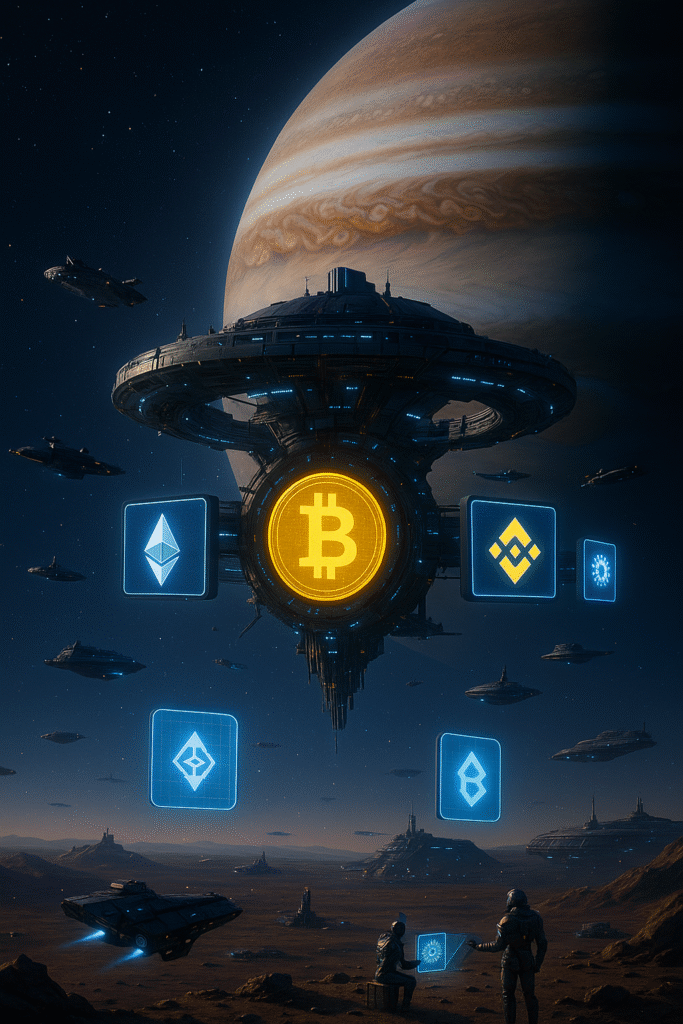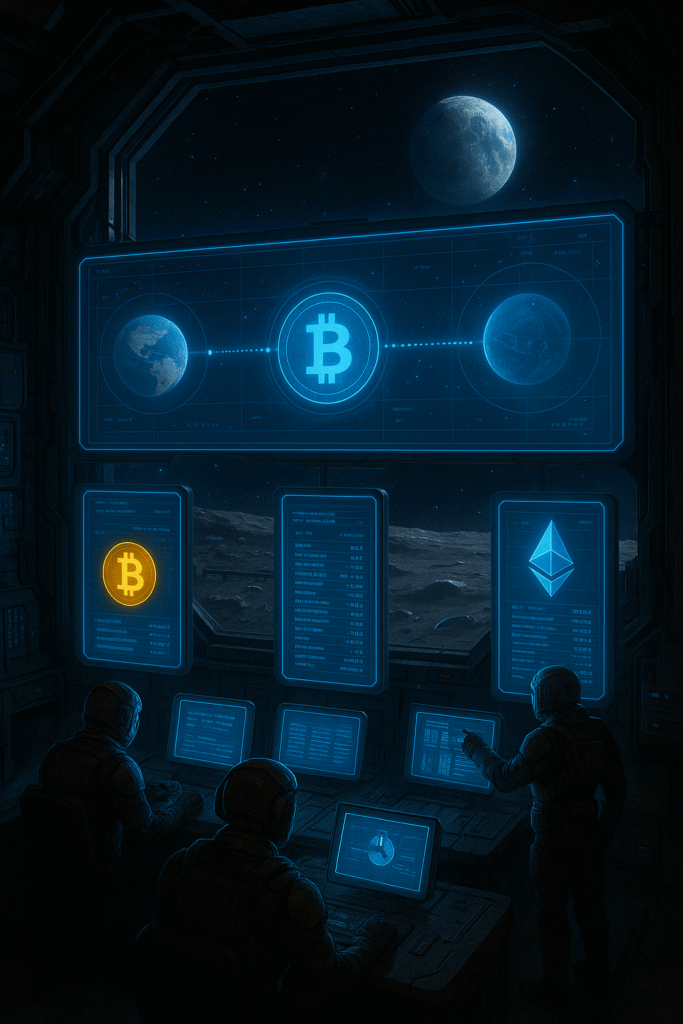By: Michael Moats
In the 21st century, the emergence of cryptocurrency marked a revolutionary shift in how we perceive and conduct transactions. Originally designed as a decentralized financial alternative free from government and institutional oversight, cryptocurrency rapidly evolved from a niche tech trend to a formidable economic force. Today, as humanity inches closer to becoming an interplanetary species, the question arises: what currency will dominate trade in the cosmos? The answer, increasingly, appears to be cryptocurrency.
This blog explores the future of cryptocurrency as the universal currency of the solar system. We will delve into how blockchain-based digital currencies offer a scalable, secure, and efficient means of facilitating interplanetary commerce, overcoming the limitations of traditional fiat systems, and enabling a new era of economic integration across planets and beyond.
The Limitations of Traditional Currencies in Space
Traditional fiat currencies are ill-equipped to function in a multi-planetary economy. They are bound by national jurisdictions, require centralized oversight, and are subject to inflationary manipulation. In the context of space exploration and colonization—where transactions may span millions of kilometers and involve multiple planetary governments—fiat systems quickly become impractical.
Moreover, time delays in communication between Earth and other planets pose a serious challenge. For instance, a signal from Mars to Earth can take between 3 to 22 minutes one way. This latency makes real-time verification by centralized authorities inefficient and costly. In such a context, decentralized and autonomous transaction protocols become not only advantageous but essential.

Why Cryptocurrency is Ideal for Space Trade
Cryptocurrencies, especially those based on robust and scalable blockchains, present several features that make them particularly suited for space-based economies:
- Decentralization: Without the need for a central issuing authority, cryptocurrencies can be managed and validated through distributed consensus, making them ideal for use across planets where no single entity may hold jurisdiction.
- Transparency and Security: Blockchain ledgers ensure that all transactions are publicly verifiable and secure against tampering—critical for maintaining trust in a dispersed interplanetary community.
- Programmability: Smart contracts can automate trade agreements, customs processes, and compliance checks across jurisdictions, dramatically reducing friction.
- Low Transaction Costs: With no intermediaries, transaction fees can be minimal, which is vital when trading across vast distances where traditional banking would be prohibitively expensive.
Building the Infrastructure for Interplanetary Crypto
Transitioning to a system of interplanetary cryptocurrency requires a foundational infrastructure that can handle the unique challenges of space:
- Interplanetary Internet (IPN): A delay-tolerant network that allows data to travel across the solar system without losing integrity.
- Localized Mining and Validation: Independent mining hubs on different planets ensure local transaction validation, preventing dependence on Earth-based nodes.
- Multi-Planetary Wallets and Exchanges: Digital wallets and exchanges adapted to function under varying planetary conditions, including gravitational and atmospheric differences.

Case Study: Mars and Earth Trade Using Bitcoin 3.0
By 2075, the Mars colony has established a thriving scientific and industrial hub. Raw materials like rare minerals and ice are exported to Earth, while Earth ships advanced technology and agricultural supplies to Mars. Traditional payment systems failed to handle the 20-minute signal delay efficiently. Enter Bitcoin 3.0—a next-generation cryptocurrency capable of near-autonomous transaction confirmation using localized consensus protocols.
Trade agreements are executed via smart contracts, escrow accounts are maintained in decentralized applications, and trade taxes are programmed directly into the blockchain. This system allows Mars and Earth to engage in seamless, tamper-proof trade despite the vast spatial separation.
Beyond the Solar System: Preparing for Interstellar Commerce
While our current focus is on Mars and the Moon, long-term prospects include colonization of Jupiter’s moons, the asteroid belt, and even exoplanets. For these ventures, a flexible, programmable, and trustless currency is essential. Cryptocurrency provides the agility required to adapt to new regulatory environments, technological constraints, and societal norms.
In fact, some futurists propose a federation of planetary blockchains—each tailored to local needs but interoperable through unified protocols. This would mirror the function of the internet, where independent nodes communicate through common standards.

Regulatory and Ethical Considerations
With new opportunities come new challenges. Regulation in space is still in its infancy. As cryptocurrency becomes the default mode of trade, legal frameworks will need to evolve to address:
- Cross-planet jurisdiction
- Taxation and revenue models
- Prevention of financial crimes like laundering or fraud
There’s also the ethical question of inclusion. Will every human (and potentially AI) entity have equal access to this universal currency? How do we ensure that interplanetary crypto does not widen the economic divide but rather unifies humanity?
The Role of DAOs and Governance in Space Economies
Decentralized Autonomous Organizations (DAOs) could serve as the governing bodies of space economies. These entities can be programmed with bylaws encoded in smart contracts, and their decisions can be made through consensus voting. DAOs can manage colony budgets, resource allocation, and even diplomatic trade relations between planets.
For example, a DAO on Titan might govern its methane export operations, using smart contracts to automatically allocate proceeds to infrastructure development, citizen dividends, and planetary defense.

The Psychological and Cultural Shift Toward a Universal Currency
The adoption of a universal cryptocurrency isn’t just a technical challenge—it’s a cultural one. Humanity has long tied currency to national identity. Detaching from fiat systems requires a collective shift in perception, where planetary citizenship supersedes national allegiance.
However, this shift may come naturally as newer generations grow up in space colonies where physical borders are less relevant, and survival depends on cooperation rather than competition. A shared, borderless currency could become a symbol of unity and progress.
Risks and Challenges Ahead
Despite its promise, several challenges remain:
- Scalability: Current blockchain systems must evolve to handle billions of transactions across solar system nodes.
- Security: Quantum computing poses a threat to current cryptographic methods.
- Resource Allocation: Mining cryptocurrencies in space must balance energy use with environmental sustainability.
- Inequality: Without safeguards, early adopters may dominate interplanetary economies.
Solving these issues will require collaboration between technologists, ethicists, policymakers, and the public.
Conclusion: One Coin to Rule the Cosmos?
As we stand on the brink of interplanetary expansion, a unified economic system is more than a convenience—it’s a necessity. Cryptocurrency offers a vision of such a system: decentralized, efficient, secure, and adaptable. It can bridge the vast distances between planets and unify diverse societies through shared protocols and values.
Whether it’s Bitcoin or a future blockchain yet to be conceived, the seeds of a solar system-wide economy are already being planted. With thoughtful development and responsible governance, cryptocurrency may not just be the future of money—it may be the foundation of a truly interplanetary civilization.
Sources
Nakamoto, S. (2008). Bitcoin: A Peer-to-Peer Electronic Cash System. https://bitcoin.org/bitcoin.pdf
NASA. (2021). Deep Space Network (DSN). https://www.nasa.gov/directorates/heo/scan/services/networks/dsn
Ethereum Foundation. (2023). Ethereum Whitepaper. https://ethereum.org/en/whitepaper/
Deloitte. (2022). Blockchain and the Space Economy. https://www2.deloitte.com/insights/us/en/industry/technology/blockchain-in-space-economy.html
ESA (European Space Agency). (2022). Interplanetary Communication: A New Frontier. https://www.esa.int/Enabling_Support/Space_Engineering_Technology/Interplanetary_Communications
CoinDesk. (2023). How Smart Contracts Will Power the Future of Interplanetary Trade. https://www.coindesk.com/interplanetary-smart-contracts
MIT Technology Review. (2024). Decentralization in a Multi-Planetary Economy. https://www.technologyreview.com/articles/decentralization-space-economy
Cointelegraph. (2023). Cryptocurrency and Space: The Next Frontier. https://cointelegraph.com/news/cryptocurrency-and-space-the-next-frontier


